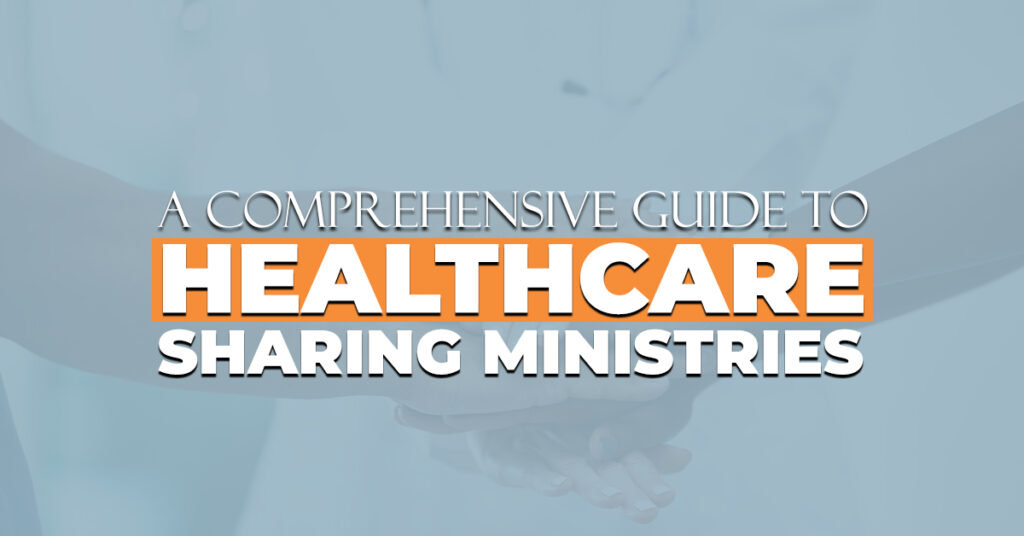A Comprehensive Guide to Health Care Sharing Ministries
A Comprehensive Guide to Health Care Sharing Ministries

As we take a closer look at healthcare options, there’s one model many people know very little about. Health care sharing ministries (HCSMs) offer a variety of perks, including communal support, financial wisdom, and faith-based values. An HCSM acts as an alternative to typical health insurance. This appeals to people who prefer a community-based and personalized approach to their specific healthcare needs.
Those searching for an alternative to conventional health insurance may find that health care sharing ministries are the next best option. By understanding more about HCSMs, including how they started, the way they operate, and their tax considerations, it will be easier to decide whether this type of healthcare works for your values and needs.
The Basics of Health Care Sharing Ministries
When it comes down to it, an HCSM is a mixture of collective responsibility and mutual aid. This healthcare model provides a method for members to support each other when a medical need is present. Created with principles of solidarity and community, the ministries are made to create an environment where similar people can merge to share financial needs associated with healthcare. This commitment reflects a belief that empathy, compassion, and altruism are essential in a community.
To be an HCSM, the organization needs to meet a set of requirements showing that it helps share medical costs among members. For instance, this requires a continuous sharing of medical expenses since 1998, which shows a tradition of mutual support within these ministries. The HCSM also needs to reach non-profit 501(C)(3) status, which shows they are serving others rather than looking for quick money.
Faith-Based Approach and Membership Requirements
HCSMs first started with deep roots in biblical principles, such as compassion and charity. In the modern world, HCSMs have moved beyond specific religious denominations. If an HCSM is associated with a faith-based group, there might be additional requirements, such as attending religious services and avoiding tobacco. However, non-denominational options are often also available for those who prefer that.
In addition to allowing more diverse members, some HCSMS have changed their requirements based on modern knowledge of wellness and health. The shift toward flexibility and inclusion has ensured that HCSMs are open to a large number of people who prefer to move away from traditional health insurance. This applies regardless of lifestyle or religion in many cases.
Contributions and Operational Mechanics
One of the things that make HCSMs unique is that they operate based on contributions, unlike typical insurance companies with premiums. Members will make annual, quarterly, or monthly contributions, and then that goes into a collective pool that everyone can dip into. When someone has medical expenses, the costs are spread out among all the members who are at a similar “sharing level.” At the same time, not all expenses can receive shared funds and there are often limitations.
The operations framework focuses on accountability and transparency and should come with clear guidelines about the sharing and administration of funds. This is what ensures funds are efficiently allocated to the right people. The idea is to always provide financial support to those who need it. This plays into the HSCM’s mutual support and ability to empower members to move forward with healthcare expenses.
Regulatory Oversight and Pre-Existing Conditions
Two considerations to be aware of with HCSMs are regulatory oversight and pre-existing conditions. Unlike traditional health insurance, an HCSM operates apart from the typical federal regulations related to insurance, including things like the Employee Retirement Income Security Act (ERISA) and the Affordable Care Act (ACA). This freedom gives an HCSM more flexibility in terms of creating programs, but it also means they do not need to meet mandates regarding pre-existing conditions.
The non-tax-deductible nature of the contributions that go into HCSMs also sets them apart from other insurance models. Most people can deduce their insurance premiums as medical expenses on their taxes, but this is not the case with an HCSM. This can impact how affordable an HCSM is for people and the importance of financial planning when selecting healthcare coverage.
Tax Considerations and Proposed Regulations
As of 2020, the IRS has proposed regulations seeking to categorize payments made to HCSMs as the same as payments for health insurance. However, up to now, no action has been taken to put this proposal into place. As such, contributions that you make to an HCSM are currently non-taxable, which can be a challenge for businesses and individuals alike.
Despite that, HCSMs remain out of a mixture of flexibility and cost-effectiveness. For many people, the lower monthly costs and the freedom to tailor their coverage based on individual needs can outweigh the lack of tax breaks. Businesses and people alike need to weigh their options carefully to determine which healthcare options are right for their needs.
Is Health Care Sharing Worthwhile?
Contributions that go into an HCSM are not tax-deductible. At the same time, healthcare sharing is versatile and affordable for many. HCSMs may be less expensive than traditional health insurance, with the average expense being about 50% lower. In addition, having the option to mix and match services based on beliefs and needs can make them extremely appealing to some people. Add in that extra flexibility and it’s not hard to see why HCSMs are a good choice for some companies and people seeking out the least expensive insurance options.
Moving Forward into the Future of Health Care
When choosing between healthcare options, health care sharing ministries remain a viable option compared to typical insurance. With principles rooted in financial pragmatism, compassion, and community, HCSMs provide a path to affordable and accessible healthcare. Tax regulation challenges remain but the benefits of flexibility and lower costs make HCSMs a good option for people of all sorts.
As we look toward the future of healthcare, health care sharing ministries have a nice blend of financial help with the support of a faith-based community. While challenges remain, the unique method of sharing medical expenses is a compelling alternative to typical insurance in a world with a plethora of healthcare options.






